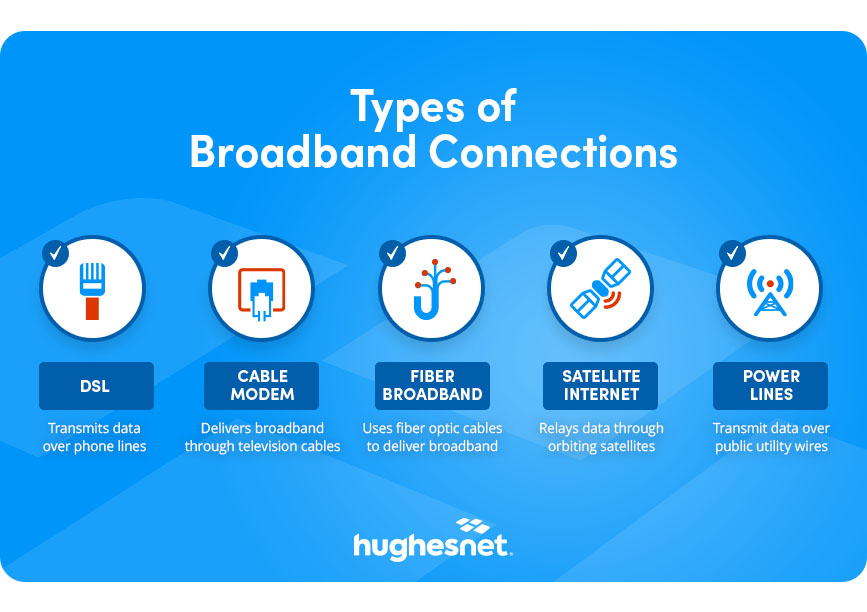
Satellite Internet vs. Broadband
You’ve likely heard the term broadband pop up in internet service provider commercials and promotions, but do you know what it means? What is broadband internet, how does it work, and how is it related to satellite internet?
Understanding Broadband Internet
What is Broadband Internet?
In technical terms, broadband describes the transmission of wide-bandwidth data over a high-speed internet connection, which the Federal Communications Commission (FCC) defines as having a minimum of 100 Mbps download and 20 Mbps upload speeds. In simpler terms, broadband is a classification for any internet connection meeting the FCC's minimum speed requirements that is available at all times, unlike older dial-up technology.
How Does Broadband Work?
Depending on local home internet plans, you may have access to broadband through six delivery systems.

- Digital Subscriber Line (DSL) transmits data over phone lines
- Cable Modem delivers broadband through television cables
- Fiber Broadband uses fiber optic cables to deliver broadband speeds
- Satellite Internet relays data through orbiting telecommunication satellites, allowing internet access from rural and remote areas.
- Power Lines transmit data over public utility wires.
Advantages and Limitations of Broadband Internet
Advantages of Broadband Internet
- Faster download speeds
- Always-on internet connections
Exploring Satellite Internet
What is Satellite Internet?
Satellite internet service is available everywhere, even in areas with slow DSL and where fiber and cable options will not reach. With satellite internet, the signal is sent from a satellite to a satellite dish mounted on your property, which connects to a modem inside. The modem includes Wi-Fi 6 so that your phone, computer, and other Wi-Fi devices can connect to the internet.

How Satellite Internet Differs from Wired Broadband
Some satellite internet services can be considered broadband as they provide internet speeds that meet the FCC’s requirements for broadband.
If you want a low-latency, reliable connection that enables gaming, streaming and video-conferencing, Hughesnet Fusion plans combine satellite and wireless technologies for a more responsive internet experience
What is the Difference between Cable and Satellite Internet?
Unlike cable and fiber internet services, satellite internet does not rely on earthbound infrastructure to connect users. It is an excellent solution if you’re wondering how to get high-speed internet in rural areas without access to the infrastructure needed for cable or fiber optic internet services.
Satellite internet services like Hughesnet® often have a larger total coverage area than earthbound internet services. Our JUPITER™ 3 High-Throughput satellite fleet provides internet service everywhere in the contiguous United States, Puerto Rico, Alaska, and many countries in Latin America.

Benefits of Satellite Internet Connectivity
- Available in remote rural and remote areas lacking cable and phone line wiring.
- 100 Mbps download broadband-level speeds.
- Quick service recovery in the event of disasters.
- Speeds often higher than promised.
You can enjoy photos, email, music listening, video streaming, working from home, and connecting your children to distance learning.
As a Hughesnet subscriber, you’ll enjoy a high-speed connection no matter where you live. Find the best satellite internet plans in your area today!



